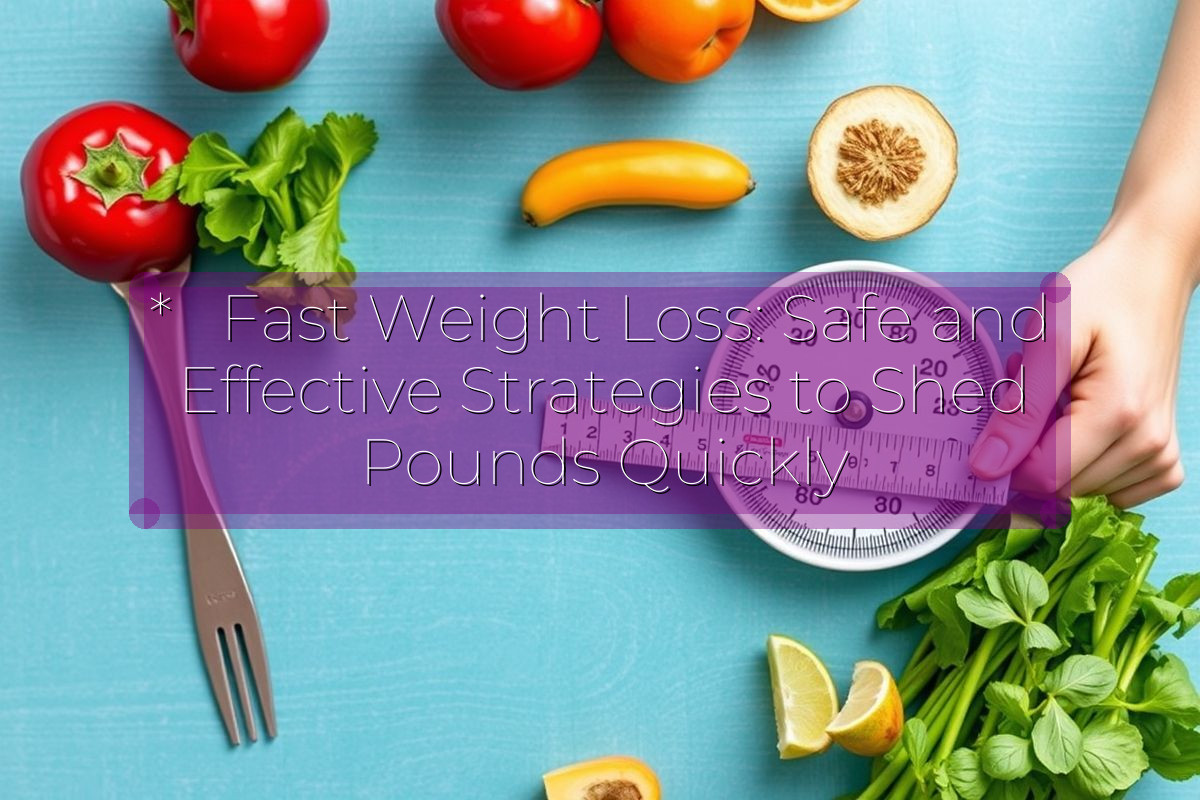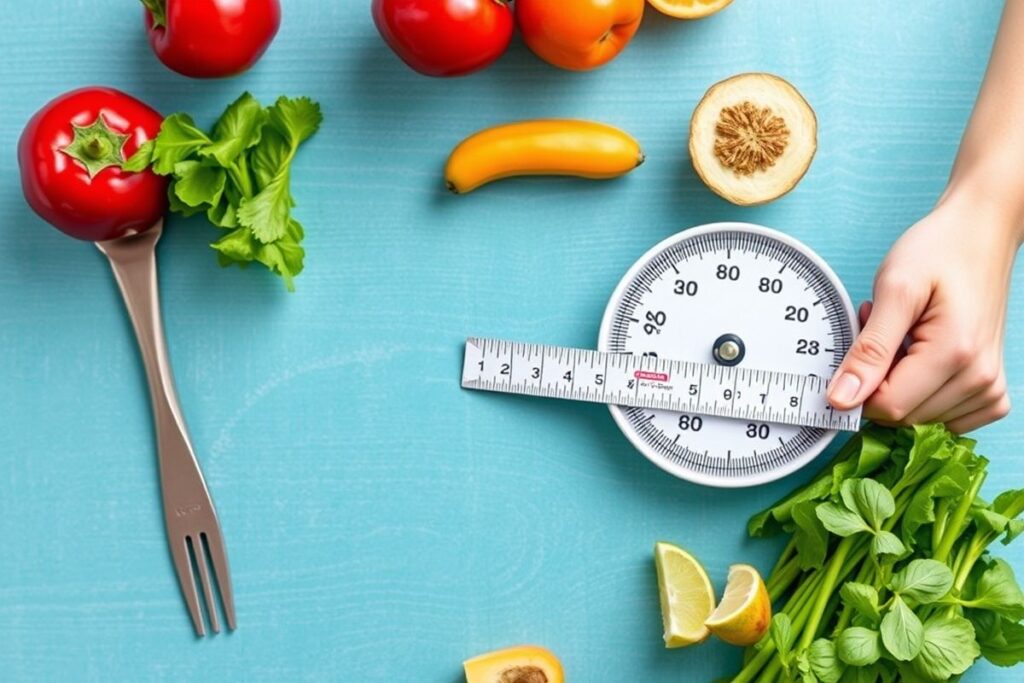
Fast Weight Loss: Safe and Effective Strategies to Shed Pounds Quickly

The quest for fast weight loss is a common pursuit, driven by various motivations, from fitting into that dream outfit to improving overall health. However, the path to shedding pounds quickly is often fraught with misinformation and potentially harmful practices. Many fad diets and quick-fix solutions promise rapid results, but these are rarely sustainable or healthy in the long run. This article aims to provide a comprehensive guide to achieving fast weight loss through safe and effective strategies, focusing on sustainable lifestyle changes rather than temporary fixes. We’ll explore the science behind weight loss, debunk common myths, and offer practical tips that can help you reach your goals without compromising your well-being. Remember, a healthy approach to fast weight loss prioritizes nutrition, exercise, and overall lifestyle adjustments, paving the way for long-term success and a healthier, happier you.
Understanding the Science of Weight Loss
The Calorie Deficit
At its core, weight loss is governed by the principle of energy balance. To lose weight, you need to consume fewer calories than you burn. This is known as creating a calorie deficit. One pound of fat is equivalent to approximately 3,500 calories. Therefore, to lose one pound per week, you need to create a deficit of 500 calories per day. This can be achieved through a combination of diet and exercise. A balanced approach is crucial, as extreme calorie restriction can lead to nutrient deficiencies, muscle loss, and a slower metabolism. Understanding your Basal Metabolic Rate (BMR), which is the number of calories your body burns at rest, can help you calculate your daily calorie needs more accurately. Online calculators and registered dietitians can assist you in determining your BMR and creating a personalized calorie plan.
However, it’s important to remember that not all calories are created equal. The source of your calories matters significantly. For instance, 100 calories from processed sugar will have a different impact on your body compared to 100 calories from whole grains or lean protein. Focusing on nutrient-dense foods that provide essential vitamins, minerals, and fiber will not only support weight loss but also improve your overall health. Prioritizing whole, unprocessed foods can naturally reduce your calorie intake while keeping you feeling full and satisfied. This approach to calorie management is more sustainable in the long run and less likely to lead to yo-yo dieting.
While counting calories can be a useful tool for understanding your energy intake, it’s not the only factor that influences weight loss. Hormones, genetics, and individual metabolism all play a role. Some people may find it easier to lose weight than others, even when following the same diet and exercise plan. It’s essential to be patient with yourself and to focus on making gradual, sustainable changes to your lifestyle. Consulting with a healthcare professional or registered dietitian can provide personalized guidance and support to help you achieve your weight loss goals safely and effectively. They can help you identify any underlying health conditions that may be affecting your weight and develop a plan that is tailored to your specific needs and circumstances.
The Role of Macronutrients
Macronutrients, which include proteins, carbohydrates, and fats, are essential components of a healthy diet and play distinct roles in weight loss. Protein is crucial for building and repairing tissues, and it also helps to increase satiety, making you feel fuller for longer. This can be particularly beneficial for fast weight loss, as it can help you reduce your overall calorie intake without feeling deprived. Good sources of protein include lean meats, poultry, fish, eggs, beans, lentils, and tofu. Aim to include a source of protein in every meal and snack to optimize its benefits.
Carbohydrates are the body’s primary source of energy, but not all carbs are created equal. Simple carbohydrates, such as those found in sugary drinks and processed foods, can cause rapid spikes in blood sugar levels, leading to increased cravings and fat storage. Complex carbohydrates, on the other hand, such as those found in whole grains, fruits, and vegetables, are digested more slowly and provide sustained energy. These types of carbohydrates are also rich in fiber, which aids in digestion and promotes feelings of fullness. Choose complex carbohydrates over simple carbohydrates whenever possible to support your weight loss efforts.
Fats are often demonized in the context of weight loss, but healthy fats are essential for hormone production, nutrient absorption, and overall health. Unsaturated fats, such as those found in avocados, nuts, seeds, and olive oil, can actually promote weight loss by increasing satiety and improving insulin sensitivity. Avoid trans fats and limit your intake of saturated fats, as these can increase your risk of heart disease. Incorporating healthy fats into your diet can help you feel satisfied and energized, making it easier to stick to your weight loss plan. Remember to consume fats in moderation, as they are calorie-dense.
Effective Strategies for Fast and Safe Weight Loss
Dietary Adjustments
Making strategic dietary adjustments is a cornerstone of fast weight loss. One effective approach is to focus on whole, unprocessed foods. These foods are naturally lower in calories and higher in nutrients compared to processed foods. This means prioritizing fruits, vegetables, lean proteins, and whole grains. These foods are packed with essential vitamins, minerals, and fiber, which can help you feel full and satisfied, reducing the likelihood of overeating. By replacing processed foods with whole foods, you can significantly reduce your calorie intake without feeling deprived.
Portion control is another crucial aspect of dietary adjustments. Even healthy foods can lead to weight gain if consumed in excessive amounts. Use smaller plates and bowls to help you visualize appropriate portion sizes. Pay attention to your body’s hunger and fullness cues. Eat slowly and mindfully, allowing your body time to register when you are full. Avoid eating in front of the television or while distracted, as this can lead to mindless overeating. By practicing mindful eating and portion control, you can effectively manage your calorie intake and support your weight loss goals.
Hydration plays a vital role in weight loss. Drinking plenty of water can help you feel full, boost your metabolism, and flush out toxins. Aim to drink at least eight glasses of water per day. You can also incorporate other hydrating beverages such as herbal teas and infused water. Avoid sugary drinks such as soda and juice, as these are high in calories and can sabotage your weight loss efforts. Staying hydrated is a simple yet effective way to support fast weight loss and overall health.
The Power of Exercise
Exercise is an indispensable component of fast weight loss, offering numerous benefits beyond calorie burning. Incorporating both cardiovascular exercise and strength training into your routine can accelerate your weight loss journey and improve your overall fitness level. Cardiovascular exercise, such as running, swimming, or cycling, helps to burn calories and improve cardiovascular health. Aim for at least 150 minutes of moderate-intensity or 75 minutes of vigorous-intensity cardiovascular exercise per week. Choose activities that you enjoy and that fit into your lifestyle to make it easier to stick to your routine.
Strength training is equally important, as it helps to build muscle mass. Muscle tissue burns more calories at rest than fat tissue, which means that increasing your muscle mass can boost your metabolism and help you burn more calories throughout the day. Strength training also helps to improve your body composition, making you look and feel more toned. Aim to incorporate strength training exercises that target all major muscle groups at least two to three times per week. Examples of strength training exercises include weightlifting, bodyweight exercises, and resistance band workouts.
Combining cardiovascular exercise and strength training is the most effective way to achieve fast weight loss and improve your overall health. Consistency is key, so find a workout routine that you enjoy and that you can stick to in the long term. Start slowly and gradually increase the intensity and duration of your workouts as you get fitter. Remember to listen to your body and take rest days when needed. Consulting with a certified personal trainer can provide personalized guidance and support to help you design an effective and safe workout plan.
| Exercise Type | Example Activities | Benefits |
|---|---|---|
| Cardiovascular | Running, Swimming, Cycling | Burns calories, improves cardiovascular health |
| Strength Training | Weightlifting, Bodyweight Exercises | Builds muscle, boosts metabolism |
Lifestyle Modifications
Sustainable fast weight loss is not just about diet and exercise; it’s also about making long-term lifestyle modifications. Getting enough sleep is crucial for weight loss, as sleep deprivation can disrupt hormones that regulate appetite and metabolism. Aim for at least seven to eight hours of sleep per night. Create a relaxing bedtime routine to help you wind down before bed. Avoid caffeine and alcohol before bed, and make sure your bedroom is dark, quiet, and cool.
Managing stress is another important aspect of lifestyle modifications. Chronic stress can lead to increased cortisol levels, which can promote fat storage, especially around the abdomen. Find healthy ways to manage stress, such as practicing yoga, meditation, or spending time in nature. Engage in activities that you enjoy and that help you relax. Consider seeking professional help if you are struggling to manage stress on your own.
Building a strong support system can also greatly enhance your weight loss journey. Surround yourself with friends and family members who are supportive of your goals. Consider joining a weight loss support group or working with a health coach. Having a support system can provide you with encouragement, motivation, and accountability, making it easier to stick to your weight loss plan and achieve your goals.
- Get enough sleep
- Manage stress
- Build a support system
Sıkça Sorulan Sorular
Conclusion
Achieving fast weight loss is a realistic goal when approached with safe and effective strategies. By understanding the science behind weight loss, making strategic dietary adjustments, incorporating regular exercise, and implementing long-term lifestyle modifications, you can shed pounds quickly and sustainably. Remember that consistency and patience are key. Avoid fad diets and quick-fix solutions, and focus on making gradual, sustainable changes to your lifestyle that you can maintain for the long term. Prioritize your health and well-being throughout your weight loss journey, and don’t be afraid to seek professional guidance and support when needed. With dedication and the right approach, you can achieve your weight loss goals and enjoy a healthier, happier life.
“`
